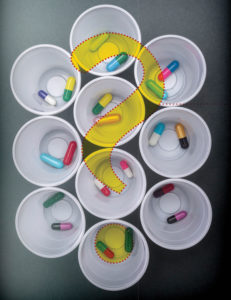The ongoing medication shortages have given rise to an online industry promoting suspect or fraudulent medications and herbal or micronutrient preparations claiming to treat ADHD. With the closure of several telehealth companies that specialized in mental health, former clients have found themselves without a prescriber for ADHD medications, and many are turning to unregulated online pharmacies and prescribers outside of the United States.
A dire health risk
These counterfeit products carry an extremely loaded health risk. Many do not contain any of the active ingredients found in prescribed stimulant medications, such as Adderall or Concerta. In their place, these fake pills frequently contain caffeine at high doses. In many instances, these pills have contained fentanyl or methamphetamine, both of which are dangerous outside of strictly controlled medical settings.
The US Centers for Disease Control and Prevention (CDC) issued a health advisory in June 2024, stating ADHD patients should avoid these online and often foreign pharmacies and their products. The possibility of receiving counterfeit pills containing illegal opioids, especially fentanyl, and then experiencing a health crisis is too great a risk to take. It stated that seven out of ten counterfeit pills seized by the US Drug Enforcement Agency contained fentanyl.
Public health officials urge ADHD patients to avoid medications provided by an individual or a company that are not licensed clinicians and licensed pharmacies and to work with healthcare providers licensed in the United States.
Medication shortages continue to disrupt life
The temptation to purchase a product online that claims to treat ADHD is understandable. Untreated ADHD means adults struggle in the workplace and in their social relationships, while children experience dropping grades and family disruptions.
The US House of Representatives Oversight Committee is continuing to investigate the reasons for the shortages and to push medication manufacturers for solutions.
“Our constituents share story after story detailing how hard it is to fill prescriptions for Adderall and that the shortage affects every element of their lives,” members of the committee wrote, addressing the chief executive officer of Teva Pharmaceuticals USA, Inc. “For example, previously capable students are now barely able to get passing grades, and adults are forced to contact every local pharmacy in an attempt to obtain a medication that may be the difference between being productive and focused in the workplace or losing their livelihoods.”
Jeremy Didier, president of CHADD’s board of directors, recently described how the medication shortages have affected both her and her family. In addition to her work with CHADD, Didier is a therapist, ADHD coach, and the mother of five children who have an ADHD diagnosis. She has seen firsthand, personally and professionally, the dangers the medication shortages have caused.
“The medication I was prescribed worked incredibly well,” she said. “My life was stable and well-managed. That is, until 2023 when roadblocks suddenly appeared in the form of DEA production limits and pharmacy stock issues. My ability to access what I consider to be lifesaving medication—for myself and my children—came to a screeching halt, and my entire family felt the impact.”
What You Can Do
“I’m so tired of people pushing the narrative that medications are terrible for you, are actually meth, or that taking an expensive supplement that you don’t know what’s in it, is better,” wrote a woman with ADHD who recently expressed her frustration on social media. “I wish people knew how to use more critical thinking when looking at these things.”
She then asked her social media group how she and others can advocate for a solution. CHADD’s public policy committee has received the same question from other members of the ADHD community.
The committee’s suggestion is to contact your federal representative or senator and sharing your experience with them is one meaningful way to advocate for a solution.
“We need to keep advocating for better access to care—whether through telehealth, addressing medication shortages, or developing long-term solutions for treatment. ADHD isn’t just a neurodevelopmental disorder—it’s a public health issue,” said Didier.
Managing the ADHD medication shortage:
- A Way You Can Address the Medication Shortage
- Tips for Handling the Medication Shortage
- Complementary and Other Interventions
- Assessing Complementary and Controversial Interventions: Tips for Parents
- ADHD Quick Facts: Complementary Interventions for ADHD
- Why Do People Seek Complementary Treatments
- Colorful Spice Shows Promise for ADHD Treatment in Research
- A Fishy Idea: Omega-3 Supplements as a Replacement for Medication
Join the discussion: Have you considered advertised supplements for ADHD?


